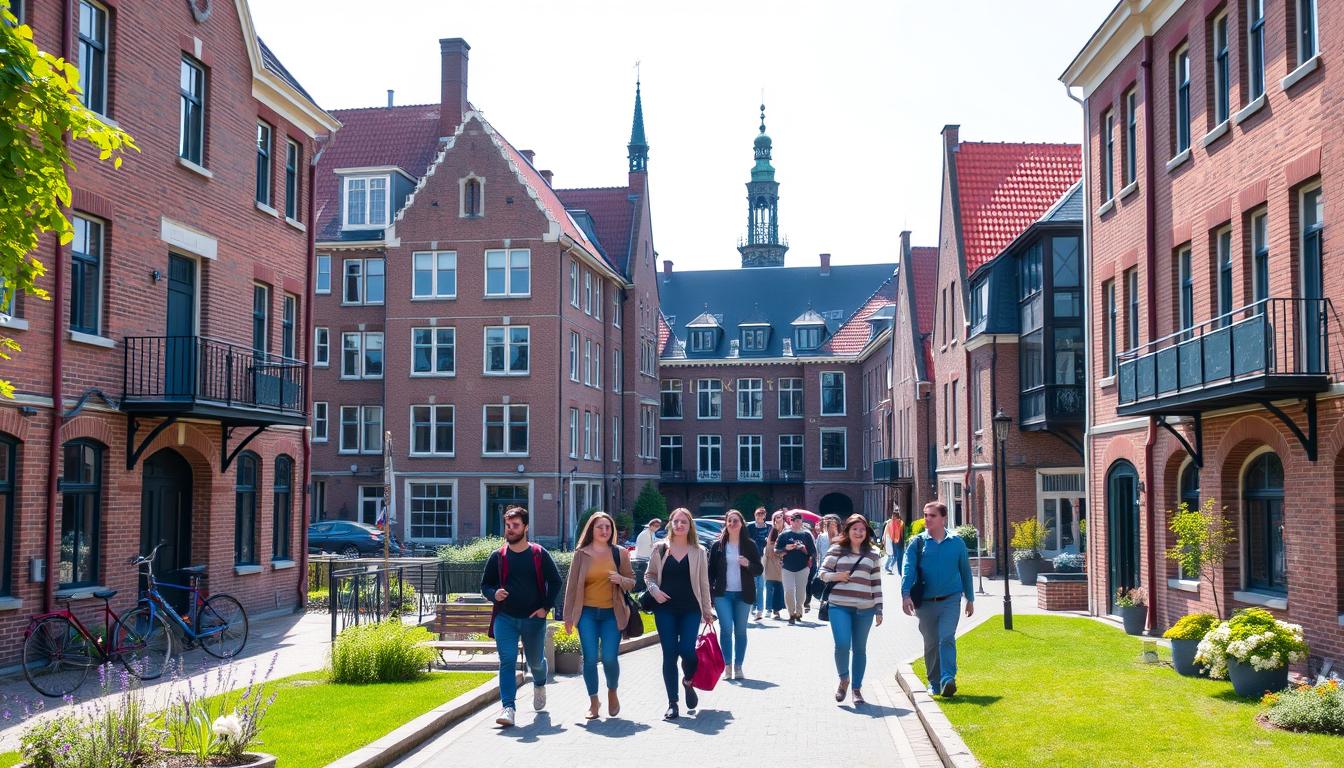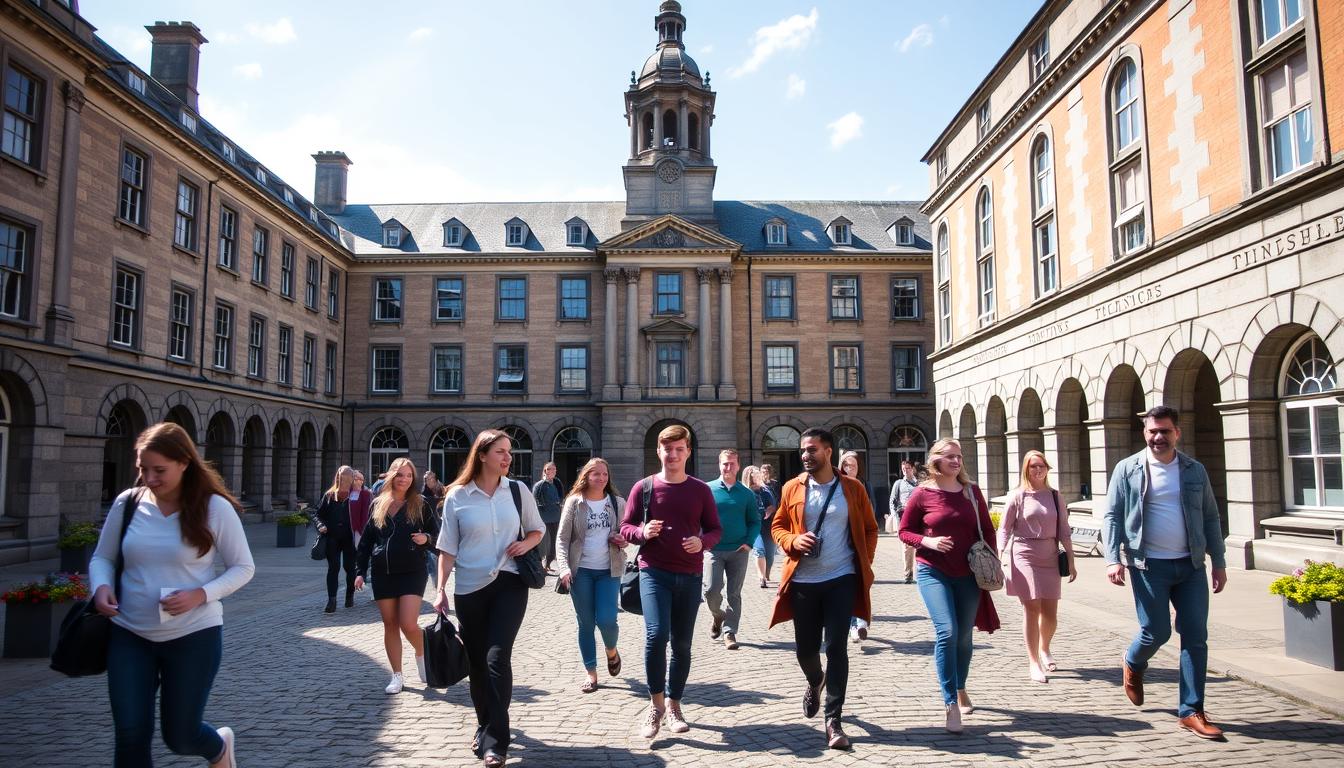Netherlands Study Visa: Admission Process
The admission process for international students wanting to study in the Netherlands follows a structured approach. Understanding each step will help you navigate the process smoothly and increase your chances of acceptance.
Step 1: University Selection
Begin by researching Dutch universities that offer your desired program. The Netherlands hosts various types of higher education institutions:
- Research Universities (WO) – Focus on research-oriented programs
- Universities of Applied Sciences (HBO) – Emphasize practical education
- Institutes for International Education – Specialized programs for international students
Consider factors like university rankings, program content, teaching language, location, and tuition fees when making your selection.
Step 2: Document Preparation
Prepare the following documents for your university application:
- Academic transcripts and diplomas (with certified translations if not in English)
- Motivation letter explaining why you chose the program and institution
- Curriculum Vitae (CV) highlighting your academic and professional achievements
- Letters of recommendation from professors or employers
- Copy of your passport
- Passport-sized photographs
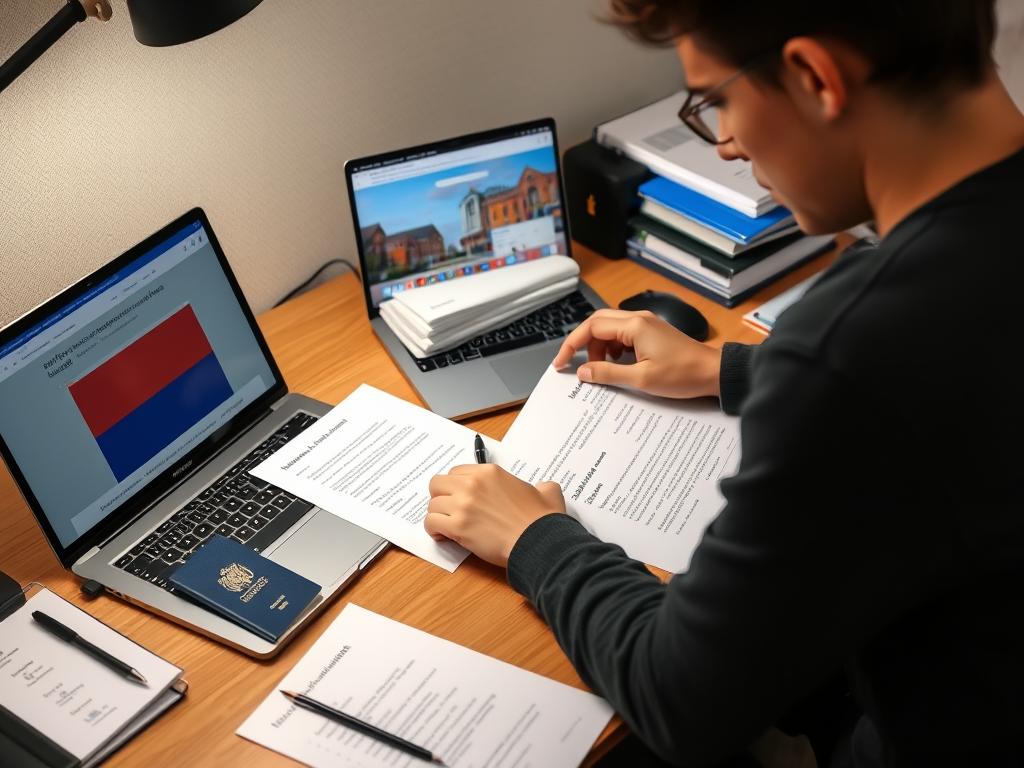
Step 3: Language Requirements
Most programs in the Netherlands require proof of English language proficiency. The commonly accepted tests include:
| Test | Minimum Score (Bachelor’s) | Minimum Score (Master’s) |
| IELTS Academic | 6.0 overall | 6.5 overall |
| TOEFL iBT | 80 | 90 |
| Cambridge English | CAE/CPE grade C | CAE/CPE grade B |
Some programs may have higher requirements, so always check the specific requirements of your chosen program.
Step 4: Application Deadlines
Dutch universities typically have two main intake periods:
- September Intake (Fall): The primary intake with application deadlines usually between January and April
- February Intake (Spring): Limited programs available with application deadlines between September and November
Non-EU/EEA students should apply at least 4-6 months before the program starts to allow sufficient time for visa processing.
Step 5: Conditional Offers
After reviewing your application, universities may issue:
- Unconditional offer – You’ve met all requirements
- Conditional offer – Acceptance pending fulfillment of specific conditions (like final exam results or language test scores)
Once you accept an offer, the university will guide you through the next steps, including the visa application process.
Need Help With Your Application?
Our education consultants can review your documents and increase your chances of acceptance at top Dutch universities.
Netherlands Student Visa Requirements
The type of visa you need depends on your nationality and the duration of your studies. Here’s what you need to know about the Netherlands study visa requirements:
Who Needs a Student Visa?
- EU/EEA/Swiss citizens: No visa required, but must register with the local municipality upon arrival
- Non-EU/EEA/Swiss citizens: Need an entry visa (MVV) and/or residence permit (VVR) for studies longer than 90 days
Types of Student Visas
- Short-stay visa (Schengen visa): For courses lasting less than 90 days
- Entry visa (MVV): Required for initial entry into the Netherlands
- Residence permit (VVR): For staying throughout your study period
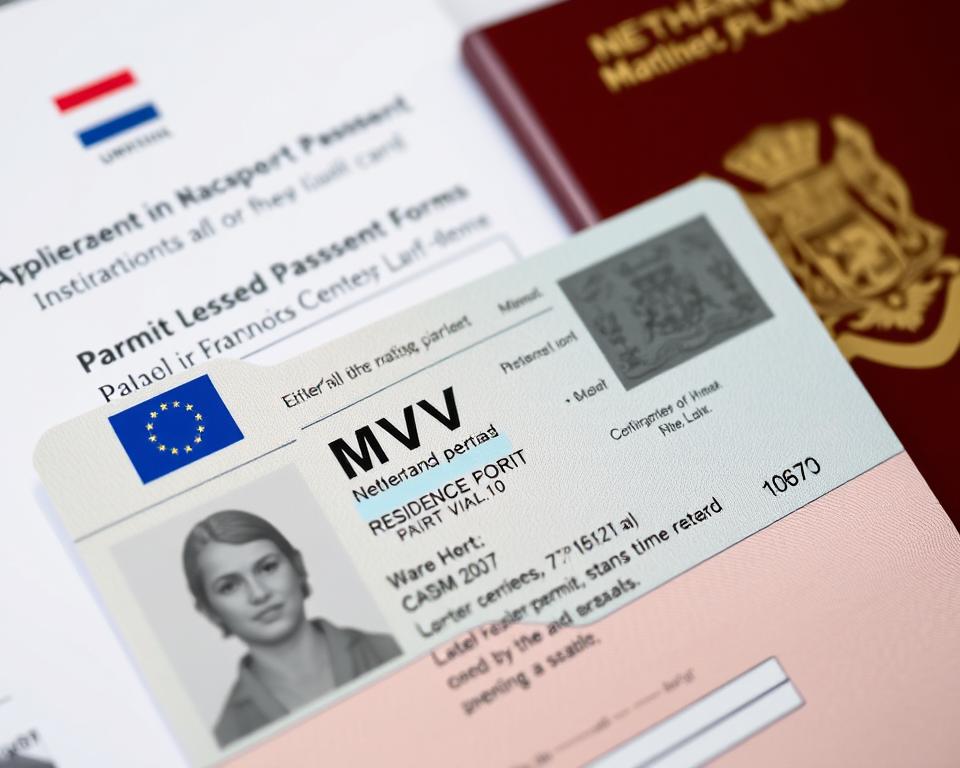
Required Documents for Netherlands Student Visa
- Valid passport (valid for at least 6 months beyond your planned stay)
- Completed visa application form
- Acceptance letter from a recognized Dutch educational institution
- Proof of sufficient financial means (€10,800 per year for living expenses)
- Health insurance coverage
- Tuberculosis test (for citizens of certain countries)
- Passport-sized photographs (meeting Schengen visa requirements)
- Proof of payment of the visa application fee (approximately €210)
Application Process
For most international students, the application process is streamlined through what’s called the “Fast-Track” procedure:
- Your Dutch educational institution applies for your entry visa (MVV) and residence permit on your behalf
- You provide all necessary documents to your institution
- The institution submits the application to the Immigration and Naturalisation Service (IND)
- Once approved, you collect your MVV from the Dutch embassy or consulate in your home country
- After arriving in the Netherlands, you collect your residence permit
Important: The processing time for a Netherlands student visa is typically 2-4 weeks, but it’s recommended to start the application process at least 3 months before your intended departure.
Scholarships for International Students in the Netherlands
The Netherlands offers various scholarship opportunities to help international students finance their education. Here are some of the top options:
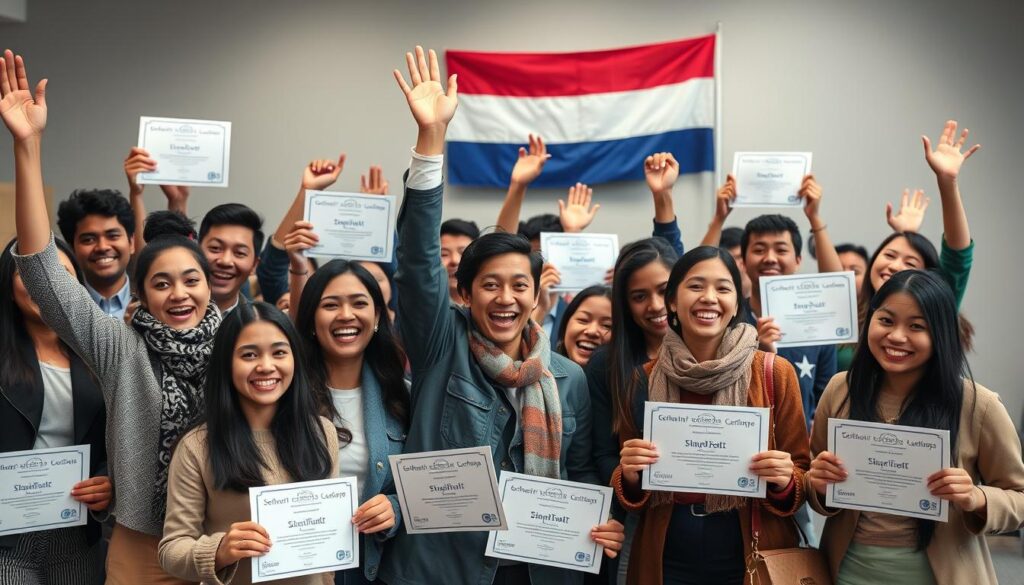
Orange Knowledge Programme
Government Funded
- Eligibility: Professionals from selected developing countries
- Coverage: Full tuition fees, living allowance, travel costs, insurance
- Duration: Up to 12 months
- Application: Through Dutch institution after admission
Holland Scholarship
Government Funded
- Eligibility: Non-EEA international students
- Award: €5,000 (one-time payment)
- Programs: Bachelor’s or Master’s degree
- Application: Through participating Dutch institutions
University-Specific Grants
Institution Funded
- Examples: Amsterdam Excellence Scholarship, Utrecht Excellence Scholarship, Erasmus University Rotterdam Scholarships
- Award: Partial to full tuition fee waivers
- Criteria: Academic excellence, specific nationality requirements
Scholarship Application Tips
- Start researching scholarships at least one year before your studies begin
- Check both university-specific and government-funded options
- Prepare a strong motivation letter highlighting your achievements and goals
- Secure strong recommendation letters from academic or professional references
- Pay close attention to eligibility criteria and application deadlines
- Submit a complete application with all required documents
- Apply to multiple scholarships to increase your chances
- Consider partial scholarships combined with personal funding
Maximize Your Scholarship Chances
Our scholarship experts can help you identify the best options and prepare a winning application.
Tuition Fees and Living Costs in the Netherlands
Understanding the financial aspects of studying in the Netherlands is crucial for planning your education abroad. Here’s a breakdown of what you can expect:
Average Tuition Fees
| Student Category | Bachelor’s Programs | Master’s Programs |
| EU/EEA Students | €2,200 per year | €2,200 per year |
| Non-EU/EEA Students | €6,000 – €15,000 per year | €8,000 – €20,000 per year |
| University College Programs | €4,000 – €12,000 per year | N/A |
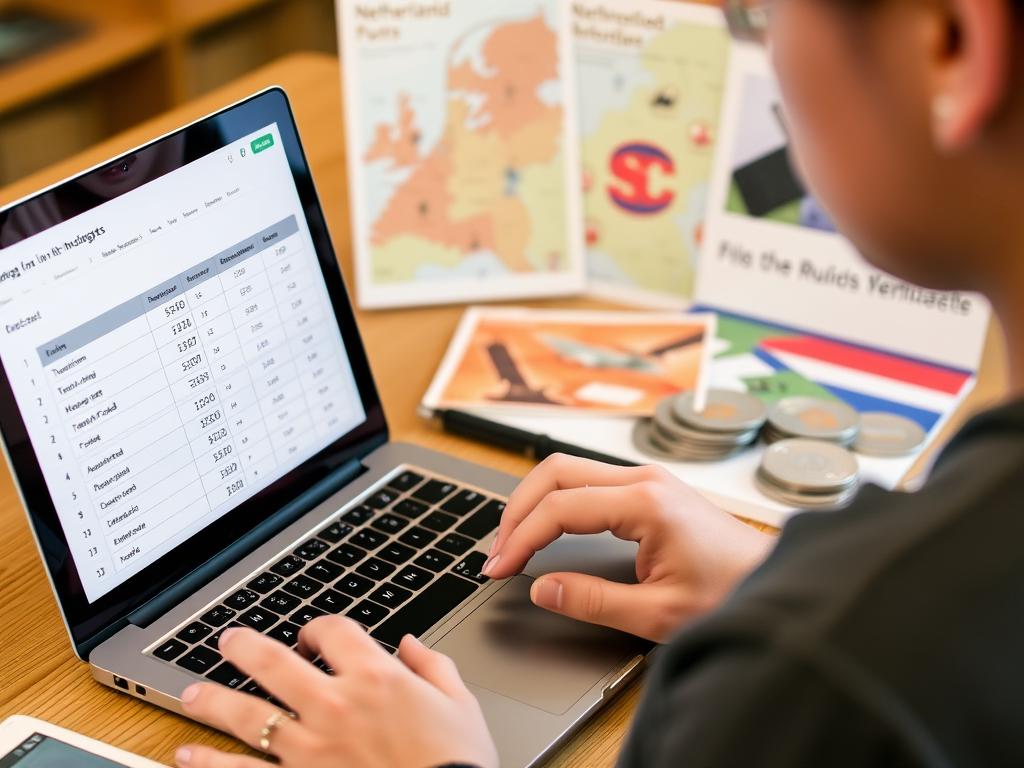
Monthly Living Expenses
| Expense Category | Monthly Cost (€) | Notes |
| Accommodation | €350 – €800 | Higher in Amsterdam, Rotterdam, Utrecht |
| Food | €200 – €300 | Including groceries and occasional dining out |
| Transportation | €40 – €100 | Student OV-chipkaart provides discounts |
| Books & Study Materials | €50 – €100 | Varies by program |
| Health Insurance | €100 – €120 | Mandatory for all international students |
| Personal Expenses | €100 – €200 | Entertainment, clothes, etc. |
Total estimated monthly expenses: €840 – €1,620
Financial Requirement for Visa: To obtain a Netherlands student visa, you must prove you have sufficient funds to cover your living expenses, typically around €10,800 per year (€900 per month).
Cost-Saving Tips
- Consider shared accommodation to reduce housing costs
- Cook at home instead of eating out regularly
- Use a bicycle for transportation (very common in the Netherlands)
- Take advantage of student discounts with your student ID
- Open a Dutch bank account to avoid foreign transaction fees
- Buy second-hand textbooks or use library resources
- Look for student housing through university accommodation services
- Consider studying in smaller cities where costs are lower
Need Financial Planning Help?
Our advisors can help you create a realistic budget and explore funding options for your studies in the Netherlands.
Part-Time Work Opportunities for International Students
Working part-time while studying can help offset your living expenses and provide valuable work experience. Here’s what you need to know about working as an international student in the Netherlands:

Work Regulations
EU/EEA Students
- No work permit required
- No restrictions on working hours
- Same rights as Dutch students
Non-EU/EEA Students
- Can work up to 16 hours per week during the academic year
- Can work full-time during June, July, and August
- Employer must obtain work permit (TWV)
Finding Part-Time Jobs
Here are some effective platforms and resources for finding student jobs:
Online Job Platforms
- StudentJob.nl
- Undutchables.nl
- Indeed.nl
- Nationale Vacaturebank
University Resources
- University career centers
- Campus job boards
- Student associations
- Alumni networks
- Faculty connections
Popular Student Jobs
- Hospitality (cafés, restaurants)
- Retail positions
- Teaching assistant roles
- Research assistants
- Customer service
Average Student Wages
The minimum wage for students in the Netherlands varies by age:
| Age | Hourly Minimum Wage (€) |
| 15 years | €3.40 |
| 16 years | €3.91 |
| 17 years | €4.48 |
| 18 years | €5.60 |
| 19 years | €6.72 |
| 20 years | €8.96 |
| 21 years and older | €10.80 |
Important: Working more hours than permitted can result in fines and may affect your residence permit. Always ensure you comply with the regulations.
Tax Information
As a student employee in the Netherlands, you need to be aware of the following tax considerations:
- You’ll need a Burgerservicenummer (BSN) to work legally
- Income tax is automatically deducted from your salary
- Students earning less than €10,108 per year may be eligible for tax returns
- International tax treaties may prevent double taxation
Post-Study Settlement Options in the Netherlands
The Netherlands offers excellent opportunities for international graduates to stay and work after completing their studies. Here’s what you need to know about your post-study options:

Orientation Year Visa (Zoekjaar)
The Orientation Year permit is a special visa that allows international graduates to stay in the Netherlands for up to 12 months to find a job or start a business.
Key Features:
- Available to graduates of Dutch higher education institutions
- Also available to graduates of top 200 world universities
- No work restrictions during this period
- No minimum salary requirement for employment
- Can be applied for up to 3 years after graduation
Application Requirements:
- Completed application form
- Valid passport
- Dutch diploma or foreign diploma from a top-ranked university
- Proof of sufficient funds (approximately €900 per month)
- Health insurance
- Application fee (approximately €210)
Highly Skilled Migrant Program
After finding employment, you can transition to the Highly Skilled Migrant permit, which allows you to stay and work in the Netherlands for the duration of your employment contract.
Eligibility Requirements:
- Employment contract with a recognized sponsor
- Meet minimum salary threshold (lower for graduates under 30)
- Valid passport and residence permit
Benefits:
- Residence permit valid for the duration of employment contract (max 5 years)
- Possibility to bring family members
- Access to the 30% tax ruling (tax advantage)
- Simplified renewal process
Path to Permanent Residence
After living in the Netherlands for five consecutive years, you may be eligible for permanent residence or Dutch citizenship.
Requirements for Permanent Residence:
- Legal residence in the Netherlands for 5 consecutive years
- Sufficient and stable income
- Passed the civic integration exam (inburgeringsexamen)
- No serious criminal record
Benefits of Permanent Residence:
- No need to renew your residence permit
- No work restrictions
- Access to social benefits
- Freedom to travel within the EU
Plan Your Future in the Netherlands
Our immigration experts can help you navigate post-study work options and create a pathway to permanent residence.
Conclusion: Your Netherlands Study Journey
Studying in the Netherlands offers a unique blend of high-quality education, international exposure, and excellent career prospects. With its innovative teaching methods, extensive English-taught programs, and welcoming atmosphere for international students, the Netherlands continues to be a top choice for those seeking a world-class education in Europe.
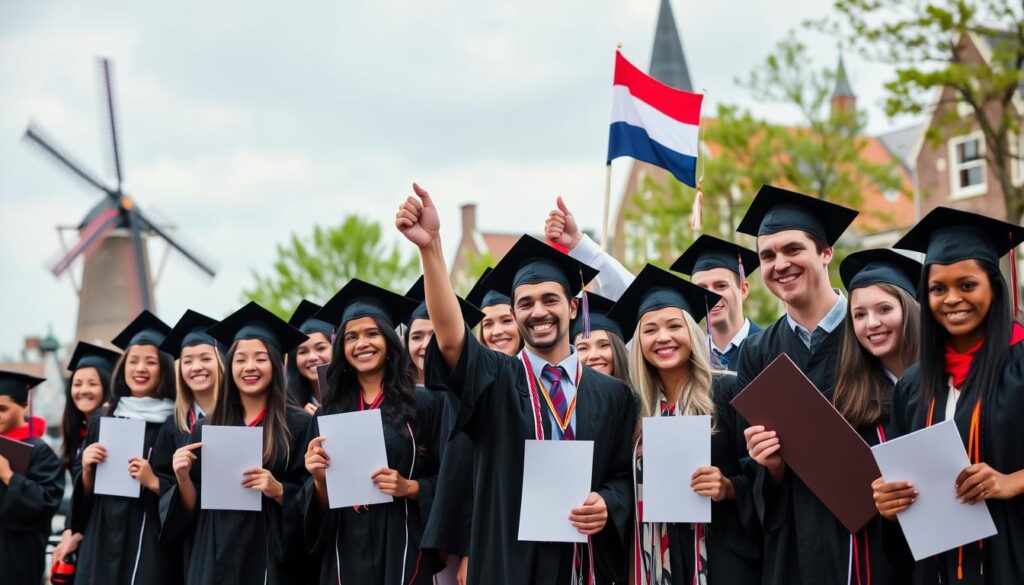
Final Checklist for Netherlands Study Visa Applicants
- Research and select suitable universities and programs
- Prepare and submit university applications
- Accept admission offer and pay any required deposits
- Gather all documents for visa application
- Apply for scholarships and arrange finances
- Submit visa application through your institution
- Arrange accommodation in the Netherlands
- Purchase health insurance
- Book flights once visa is approved
- Register with local municipality upon arrival
By following this comprehensive Netherlands study visa guide, you’re well on your way to embarking on an enriching educational journey in one of Europe’s most innovative and welcoming countries. From admission and scholarships to part-time work and post-study settlement options, the Netherlands offers a complete package for international students seeking quality education and global career opportunities.
Ready to Start Your Netherlands Study Journey?
Our experienced consultants can guide you through every step of the process, from university selection to visa application.
Frequently Asked Questions
How long does it take to process a Netherlands student visa?
The processing time for a Netherlands student visa is typically 2-4 weeks after submission of a complete application. However, it’s recommended to start the application process at least 3 months before your intended departure to allow for any potential delays.
Can I study in the Netherlands without IELTS?
Some Dutch universities accept alternative English proficiency tests like TOEFL, Cambridge English, or PTE Academic. Additionally, if you’ve completed previous education in English, some institutions may waive the language test requirement. Always check the specific requirements of your chosen program.
Can family members join me during my studies in the Netherlands?
Yes, as an international student, you can bring your spouse/partner and children under 18 years old. You’ll need to prove sufficient financial resources to support them (approximately €1,500 extra per month), and they’ll need to apply for a dependent visa.
